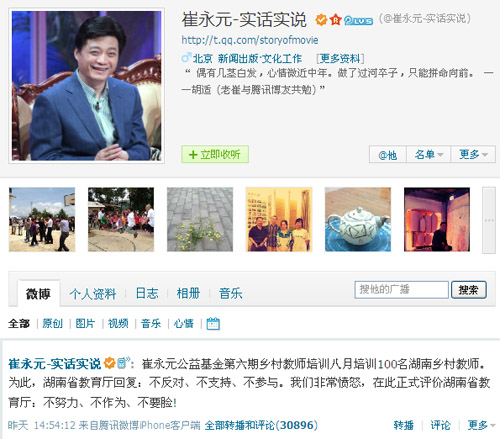Cui Yongyuan [1], a well-known China Central Television presenter, recently berated [2] [zh] education officials in the Hunan Province, after they expressed their indifference to helping a rural teacher training project. On Sina Weibo, a Chinese microblogging website, Cui wrote that official correspondence from the Hunan education authority stated [2] [zh] that “[we] do not oppose, support or [plan to] participate in the Rural Teacher Project.”
The program, which aims to select hundreds of rural teachers from Hunan for training, is funded by a private charity run by Cui. In response to these ‘three no’s’, Cui followed with his own furious response, “No effort, no principle, no face!” The entire account was republished on NDdaily [2] [zh].
Big government

Image of Cui's Weibo post that sparked debate.
China has long been perceived as having a ‘big government’ and ‘small society’ but many citizens desire change [3]. Most non-governmental organizations (NGOs) and charities in China are in their infancy and often have to seek [4]government [4]support [4] to get work done.
But according to the 2011 China Charity Donation Report published on people.com.cn [5] [zh], in 2010 more than 58.3% of private donations were channelled back to government or government-controlled charities, and only 1.3% trickled down to grassroots social welfare NGOs.
 [6]
[6]58.3 percent of private donations were channelled directly or indirectly to the Chinese government in 2010. Image source Digital Zhongguancun.
NGOs struggle
Cui's response quickly turned into a national debate over the relationship between the government and NGOs in China. Some criticized the Hunan authority for not supporting civic efforts while others disagreed with Cui Yongyuan's views.
The University of Hong Kong's China Media Project translated [7] Chinese media researcher Yan Lieshan's opinion on this issue. Yan, who also has experience organizing rural education programs in China, believes that because the education sector is state-controlled, it is impossible to carry out any education-related project without government support [8] [zh]:
没有湖南省教育主管部门的同意,也根本不可能进行。如果“越过”省教育厅,直接找“下边的”市县教育部门,“下边的”教育官员会为难;如果没有教育主管部门的同意,极少有校长敢“擅自”同意他的教师进京。什么叫“不反对”?人家免费帮助培训你辖区的教师,你有什么理由反对?说得倒好像他本来有权力反对,现在宽宏大量“不反对”,小崔们应该谢恩似的, 人家做好事,你凭什么“不支持”?
A question of independence?
In the Chinese daily newspaper Southern metropolis [9] [zh], influential investigative reporter Guo Yukuan (郭宇宽) expressed a different opinion:
NGO是非政府组织,天然就和政府有一定距离,正是因为政府工作有其自身逻辑,NGO独立的探索才有其特别的意义。特别是乡村教师的培训,如果是教育厅牵头组织的,那一定是官方色彩非常浓厚的,民间的探索完全可以是个性化的。
Current affairs commentator Wei Yingjie (魏英杰), echoed Guo's views [10] [zh], emphasizing that NGOs should be an independent sector:
但要搞清楚的是,政府该如何支持民间公益。政府对民间公益活动,自然应持欢迎态度,并提供各种便利。在一些情况下,政府出资购买民间公益组织的社会服务,也不失为弥补政府职能欠缺的一种办法。但是让政府部门发公文,要求下属部门配合民间公益活动,或者直接参与其中,扮演民间公益组织的角色,这肯定不是合理途径。这样做,政府职能与民间公益只会重叠一起,使得民间公益变得面孔暧昧。其结果是,民间公益组织要么变成官方慈善机构,要么沦为政府部门的应声虫。